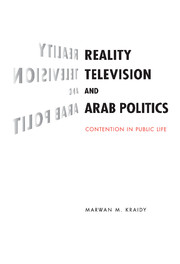Book contents
- Frontmatter
- Contents
- Acknowledgments
- Preface
- Introduction: Beyond al-Jazeera
- 1 Screens of Contention: The Battle for Arab Viewers
- 2 Voting Islam Off the Island? Big Brother in Bahrain
- 3 The Saudi-Lebanese Connection
- 4 Contesting Reality: Star Academy and Islamic Authenticity in Saudi Arabia
- 5 Gendering Reality: Kuwait in the Eye of the Storm
- 6 A Battle of Nations: Superstar and the Lebanon-Syria Media War
- 7 The “New Middle East”? Reality Television and the “Independence Intifada”
- Conclusion: Performing Politics, Taming Modernity
- List of Interviews
- Further Readings
- Bibliography
- Index
- Titles in the Series
Introduction: Beyond al-Jazeera
Published online by Cambridge University Press: 05 June 2012
- Frontmatter
- Contents
- Acknowledgments
- Preface
- Introduction: Beyond al-Jazeera
- 1 Screens of Contention: The Battle for Arab Viewers
- 2 Voting Islam Off the Island? Big Brother in Bahrain
- 3 The Saudi-Lebanese Connection
- 4 Contesting Reality: Star Academy and Islamic Authenticity in Saudi Arabia
- 5 Gendering Reality: Kuwait in the Eye of the Storm
- 6 A Battle of Nations: Superstar and the Lebanon-Syria Media War
- 7 The “New Middle East”? Reality Television and the “Independence Intifada”
- Conclusion: Performing Politics, Taming Modernity
- List of Interviews
- Further Readings
- Bibliography
- Index
- Titles in the Series
Summary
On March 3, 2004, the journalist Ahmad Mansour introduced an episode of Bila Hudud (No Boundaries), a widely followed talk show on al-Jazeera:
Though the West has made great strides in many fields and human rights … Arabs have specialized in mimicking the worst the West has to offer. As soon as there is a strange or deviant fad in food, drink, fashion, triviality and folly, Arabs rush madly upon it, imitating it blindly and ignorantly. The most prominent symptom [of this imitation] is the proliferation of … television programs copied from European television and based on degeneration, nudity, gyrating, triviality, void, voyeurism, the end of privacy and the dissemination of Western social ills under the heading of reality TV. This kind of program has infested Arab television as channels compete to acquire reality TV formats, copy them for Arab youth, and mobilize millions of viewers to follow who does what and who says what, thus toppling and destroying the values, culture, civilization and identity of Arab society.
The episode, entitled “Mimicking Western Programs and Imposing Them on Arabs,” aired three days after the Saudi-owned Middle East Broadcasting Center (MBC) shut down al-Ra'is, the Arabic version of Big Brother, and less than three months after the Lebanese Broadcasting Corporation (LBC) aired the first episode of Star Academy. Reaching two dozen Arab countries by satellite, these reality shows instigated a firestorm of contention over politics, commerce, religion, and sexuality.
- Type
- Chapter
- Information
- Reality Television and Arab PoliticsContention in Public Life, pp. 1 - 21Publisher: Cambridge University PressPrint publication year: 2009



